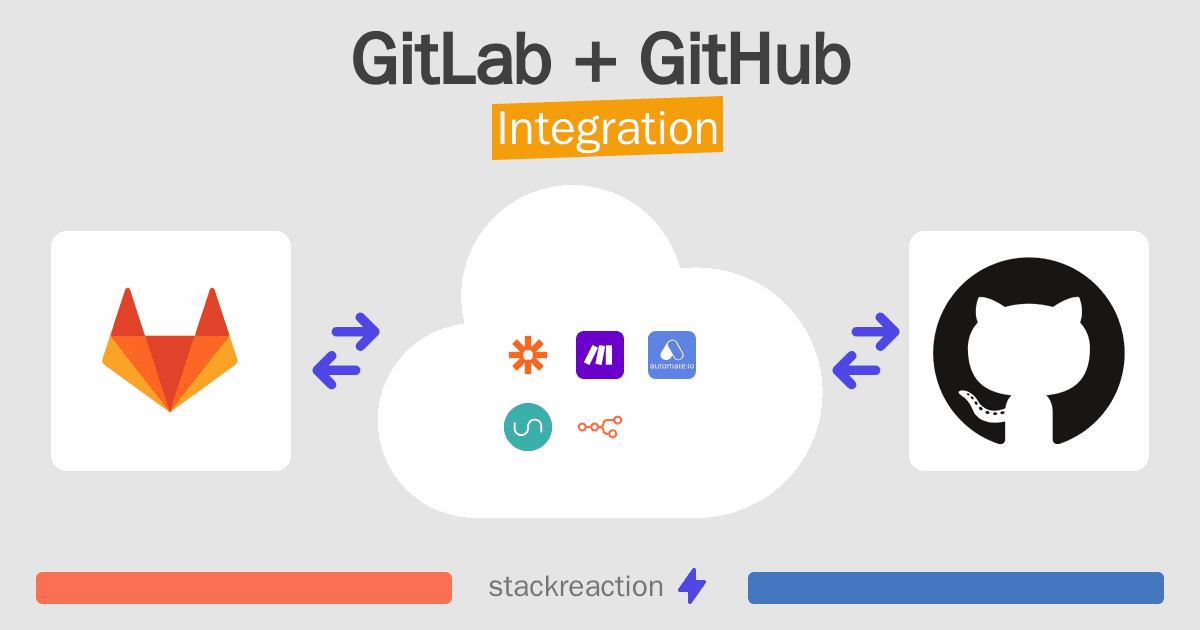How to connect GitLab and GitHub
Workflow Automation Platforms supported by GitLab and GitHub
You can automate tasks between GitLab and GitHub with ease, even without any coding experience. These no-code workflow automation platforms enable businesses to streamline their workflows in a simplified manner. Discover the best fit for your business by checking out this list.
- Make.com. Make.com (Integromat) is a powerful automation tool that enables users to connect their favorite apps, services, and devices without any coding skills. With its unique features, users can automate even complex integrations easily and efficiently, saving time and effort. Integromat allows to connect apps and automate processes in a few clicks.
- Zapier. Zapier simplifies busy people's lives by automating web app data transfers, reducing tedious tasks, and allowing teams to collaborate effortlessly. With over 5,000 popular apps connected, it's never been easier to streamline your workflow.
- n8n.io. n8n is a workflow automation tool, which helps to connect different apps and tools between each other using it's open, fair-code model. n8n is available as an open-source (only fair-code use) software and as a cloud service.
- Unito. Unito is a top-tier, no-code integration solution that enables seamless workflows across multiple apps. With two-way syncing, updates between tools are reflected in real-time. Choose from multiple integrations to streamline your team's efforts and increase productivity.
- Integrately. Integrately helps to integrate your apps in 1 click using easy to set up automation templates. Live chat support and an impressive 10k+ customer base set it apart.
- Pipedream. Pipedream is a low code integration platform for developers, which helps to connect APIs fast.
- Pricing Options
- FreemiumFree Trial
- Starting From
- 10$/month
- Pricing Options
- FreemiumFree Trial
- Starting From
- 30$/month
- Pricing Options
- FreemiumFree Trial
- Starting From
- 20€/month
- Pricing Options
- FreemiumFree Trial
- Starting From
- 10$/month
- Pricing Options
- FreemiumFree Trial
- Starting From
- 30$/month
- Pricing Options
- FreemiumFree Trial
- Starting From
- 19$/month
GitLab and GitHub Integration Price
When it comes to optimizing your workflow and streamlining tasks, integrating GitLab and GitHub can be seamlessly achieved using no-code or low-code automation tools. However, it is crucial to understand the pricing aspects.
Need to know the pricing information for automation services supporting GitLab and GitHub integration? We've done the hard work for you! Check out our table below for details based on 100, 1K, 10K and 100K basic automations per month.
A basic automation is a scenario that comprises of a trigger and a single action. An example of this is automatically sending an email every time someone fills out a form.
| Automation Platform | 100 | 1K | 10K | 100K |
|---|---|---|---|---|
Volume: 100 Plan: Free $0 Volume: 1K Plan: Core $10.59 Volume: 10K Plan: Core $18.82 Volume: 100K Plan: Core $214.31 | $0 Free | $10.59 Core | $18.82 Core | $214.31 Core |
Volume: 100 Plan: Free $0 Volume: 1K Plan: Starter $58.5 Volume: 10K Plan: Professional $193.5 Volume: 100K Plan: Professional $733.5 | $0 Free | $58.5 Starter | $193.5 Professional | $733.5 Professional |
Volume: 100 Plan: Starter $20 Volume: 1K Plan: Starter $20 Volume: 10K Plan: Pro $50 Volume: 100K Plan: | $20 Starter | $20 Starter | $50 Pro | |
Volume: 100 Plan: Starter $29.99 Volume: 1K Plan: Starter $29.99 Volume: 10K Plan: Professional $49 Volume: 100K Plan: Business $299 | $29.99 Starter | $29.99 Starter | $49 Professional | $299 Business |
Volume: 100 Plan: Free $0 Volume: 1K Plan: Free $0 Volume: 10K Plan: Basic $29 Volume: 100K Plan: Business $499 | $0 Free | $0 Free | $29 Basic | $499 Business |
Triggers and Actions supported by GitLab and GitHub
Integrating GitLab and GitHub often involves finding automation that is suitable for your business request.
Automations serve as a workflows that connect your applications, automating a business process. The Trigger acts as the event that initiates the automation, while the Action denotes the executed event.
Our extensive collection of available Triggers and Actions from various Workflow Automation Platforms allows you to fully assess integration possibilities and make informed decisions on integrating GitLab with GitHub.
When this happens
Select a Trigger
Do this
Select an Action
How to setup GitLab and GitHub integration
Step 1: Use a Workflow Automation Service that is compatible with both GitLab and GitHub. Choose automation platform
60 seconds
60 secondsStep 2: Securely authenticate GitLab and GitHub on the chosen automation service before proceeding.
60 seconds
60 secondsStep 3: Choose a Trigger for GitLab, which will start your automation scenario. Explore Triggers
15 seconds
15 secondsStep 4: Choose an appropriate Action to be executed by GitHub once your automation scenario is triggered. Explore Actions
15 seconds
15 secondsStep 5: Set up the data exchange between GitLab and GitHub and configure the parameters to meet your requirements.
120 seconds
120 secondsStep 6: Test and publish your integration. That's it! Enjoy the benefits of no-code automation!
More integrations to GitLab
Explore the list of other popular GitLab integrations. GitLab Integrations
More integrations to GitHub
Explore our list of other popular GitHub integrations to find new automation scenarios. GitHub Integrations
GitLab and GitHub integration Diagram

Frequently Asked Questions
Does GitLab integrate with GitHub?
- You can connect GitLab and GitHub automatically using no-code Workflow Automation Tool. Use Make.com, Zapier, n8n.io, Unito, Integrately or Pipedream to link GitLab and GitHub.
Can you Integrate GitLab and GitHub for free?
- Yes, you can use the free plan of Make.com, Zapier, Integrately or Pipedream to connect GitLab to GitHub for free, albeit with some limitations. You can use open source workflow automation tool n8n.io to self-host your integration script between GitLab and GitHub.

